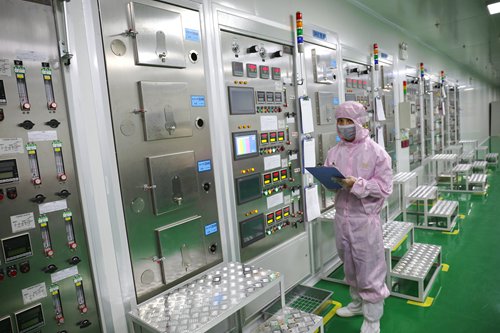
A worker inside a chip plant in Chizhou, East China's Anhui Province in November 2017. Photo: VCG
Reported discussions between US technology giant Apple Inc and Chinese chipmaker Yangtze Memory Technologies Co (YMTC) reflect Apple's premium pricing strategy and its efforts to localize its services in line with the Chinese market, industry analysts said on Wednesday.
Apple may buy NAND flash chips from YMTC, Japanese financial news outlet Nikkei Asian Review reported during the Chinese lunar new year holiday. The deal would involve Apple's first purchase of memory chips from a Chinese manufacturer which will boost local industry growth, the media report said.
YMTC, a State-backed chip company worth $24 billion, is based in Wuhan, Central China's Hubei Province. The company has become a national base for semiconductor production, according to its website.
Apple did not respond to an interview request sent by the Global Times on Wednesday. YMTC could not be reached on Wednesday.
Apple has been diversifying its components suppliers in recent years to help maintain its profit margins, Xu Xiaohai, a veteran industry insider, told the Global Times on Wednesday. "For example, in order to strike a balance among baseband chipset suppliers, Apple looked at a possible partnership with MediaTek to counterbalance companies like Qualcomm and Intel," Xu said.
The US company has also invested in LG Display in terms of OLED panels to reduce its dependence on Samsung, he noted.
The total memory market grew by about 58 percent year-on-year in 2017 with another 11 percent year-on-year gain forecast for 2018, the global industry consultancy IC Insights said in a report released in October 2017. Growth is being driven by the DRAM and NAND flash segments.
"The NAND flash market is dominated by Samsung, SK Hynix, Micron and Toshiba. Considering high prices for chips, as well as the slowing smartphone market, Apple has to seek new suppliers," Xu said.
But it is still too early to expect any concrete deal between Apple and YMTC, as the Chinese manufacturer has not begun mass production, Wang Yanhui, head of the Shanghai-based Mobile China Alliance, told the Global Times on Wednesday.
"The company is set to begin mass production in the second half of 2018, but it will take time to evaluate its capacity, product quality and pricing mechanism," he said.
Whether YMTC can compete with major players such as Samsung and SK Hynix remains uncertain, noted Liu Kun, vice general manager of IC Industry Research Center of CCID Consulting.
YMTC reportedly developed a 32-layer 3D NAND flash memory chips last year, which shows it is rapidly catching up with foreign rivals in core technologies, Liu said.
"Although it has produced this sample batch, without mass production, it's hard to predict how mature its technical procedures will be," he told the Global Times on Wednesday.
The Chinese government has been urging the creation of a self-sufficient semiconductor industry in recent years, and it has announced investment up to $50 billion in a few key projects in the country, according to the multinational industry association Semiconductor Equipment and Materials International.
YMTC's strategy is in line with this drive. In addition, YMTC is likely to become the only choice for Apple, which wants to reduce its dependence on Samsung, Liu said.
"Unlike Samsung and SK Hynix, YMTC will play a role more like an (original equipment manufacturer) instead of building its own brand," he said, noting that the positioning of the Chinese chipmaker is in line with Apple's strategy of building up its own chipsets.
Still, the potential cooperation between Apple and YMTC shows the tech giant's aim to be stick to the Chinese market, analysts noted.
With the rise of Chinese smartphone makers, Apple has not reached its expectations in terms of performance in the Chinese market, Xu noted.
"The Chinese government has considered information security as part of its national strategy, so foreign players have to abide by local rules and regulations in China," he said, noting that working with Chinese strategic chipmakers may help Apple to expand in China.
The tie-up between Apple and Guizhou-Cloud Big Data Industry in iCloud operations is further evidence of localizing, Xu added.
"Smartphones can go global, but data management cannot," Wang said. "Just as Huawei has to locate its servers in Europe when it operates there, when foreign technology companies enter the Chinese market, they will have to localize their data service and management."


